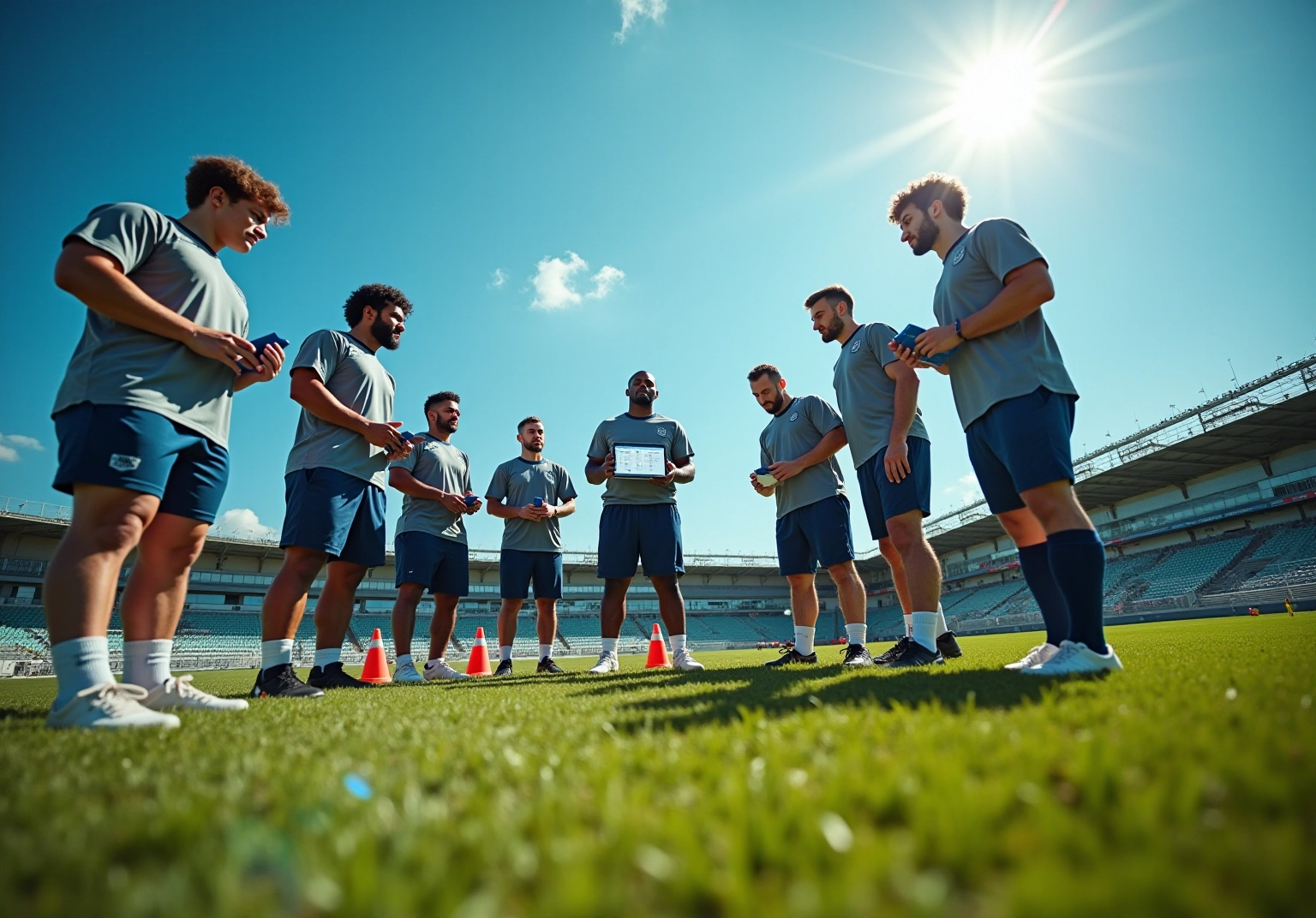
10 Ways AI in Sports Enhances Performance and Engagement
GeneralOverview
AI in sports is revolutionising performance and engagement through enhanced communication, real-time analytics, personalised training, and injury prevention strategies. This article explores how AI not only facilitates effective team collaboration but also provides critical insights for tactical planning. By customising athlete training and predicting injuries, AI is creating a more efficient and engaging sports environment for both athletes and fans. The integration of AI solutions is not just beneficial; it is essential for the future of sports.
Introduction
AI is rapidly transforming the sports landscape, introducing innovative solutions that significantly enhance performance and engagement across multiple dimensions. By revolutionising team communication and providing real-time performance analytics, the integration of AI presents a myriad of opportunities for athletes, coaches, and fans alike. However, as this technology evolves, critical questions arise regarding its implications—how can teams effectively harness AI to secure a competitive edge while navigating the ethical challenges it presents? This exploration delves into ten compelling ways AI is reshaping the sports industry, revealing both the advantages and complexities inherent in its adoption.
Agentics: Revolutionizing Team Communication with AI Solutions
Agentics harnesses advanced tools for AI in sports to revolutionise interactions among sports group members. By leveraging voice and text AI agents, these groups can automate routine communications, guaranteeing that essential information is disseminated promptly and accurately. This automation not only bolsters collaboration but also empowers coaches and players to concentrate on strategy and execution rather than administrative tasks.
For example, automated alerts regarding training schedules or game strategies can be disseminated instantaneously, ensuring that all members remain coordinated and informed. The integration of AI in sports significantly enhances group communication efficiency, fostering a more unified and responsive environment that ultimately drives productivity and engagement.
Performance Analytics: Leveraging AI for Real-Time Game Insights
AI in sports is revolutionising how teams evaluate player movements, game statistics, and rival strategies in real-time with the help of analysis tools. By processing vast datasets, these tools provide coaches with critical insights into player performance, facilitating informed decision-making during matches.
For instance, AI can detect patterns in an opponent’s play style, allowing teams to adjust their strategies dynamically. This analytical capability not only enhances competitive advantage but also supports comprehensive post-game evaluations, fostering continuous improvement.
The global market for AI in sports is projected to reach nearly $21 billion by 2029, highlighting the increasing reliance on these technologies in sports. Coaches are increasingly leveraging AI insights to optimise strategies, with platforms like AlphaPlay showcasing their effectiveness in pinpointing opponent vulnerabilities and streamlining game preparations.
Notably, teams such as Chennai Super Kings and Mumbai Indians have reported measurable advancements in metrics through AI integration. As AI in sports continues to evolve, with advancements in tailored training and injury forecasting, its incorporation into coaching methods is becoming essential for teams aiming to enhance performance and engagement.
Injury Prevention: Utilizing AI for Predictive Health Management
AI in sports is revolutionising injury prevention by leveraging data analytics to predict and mitigate risks. Machine learning algorithms examine player workload, biomechanics, and past injury patterns, enabling organisations to evaluate training intensity and recovery metrics efficiently. A study involving over 1,700 data points from rugby players demonstrated that AI could predict severe non-contact leg injuries with 82% accuracy, identifying critical risk factors such as reduced hamstring strength and increased muscle soreness.
By utilising these insights, teams can customise training programmes and closely observe participants, ensuring they stay healthy and competitive throughout the season. This proactive strategy not only improves player safety but also maximises capabilities, enabling competitors to participate fully in their activity.
As Seren Evans, a Physiotherapist & Research Associate, states, “By merging the accuracy of AI with the insights of athletic science and medicine, we are on the verge of a revolution in injury prevention and enhancement.”
Furthermore, the use of AI in sports is demonstrated by AI-driven wearable technology that monitors sports participants’ movements and heart rates in real-time, showcasing the versatility of AI applications across various sports. As AI progresses, its incorporation into predictive health management will transform how teams address AI in sports care and improvement.
Personalized Training: AI-Driven Feedback for Athlete Development
The use of AI in sports is revolutionising sports development by meticulously analysing performance data to create personalised training programmes that adapt in real-time. This innovative approach addresses critical factors such as fatigue levels, skill proficiency, and recovery status, enabling the use of AI in sports to deliver tailored feedback that empowers individuals to optimise their training sessions.
For example, when a competitor encounters challenges with a specific technique, the AI can suggest targeted drills designed to refine that skill, ensuring a focused and effective training regimen. This immediate feedback accelerates skill acquisition and fosters a profound understanding of personal metrics, ultimately leading to improved performance on the field.
Trainers have observed that AI in sports significantly enhances the training experience, enabling athletes to make informed adjustments that elevate their performance levels.
Fan Engagement: AI-Enhanced Experiences for Spectators
AI in sports is revolutionising fan interaction in athletics by delivering tailored content and engaging experiences. By analysing fan preferences and behaviours, AI in sports provides customised offerings such as personalised game highlights and exclusive behind-the-scenes footage. Notably, the NBA’s League Pass has experienced a remarkable 48% increase in viewing time following the implementation of fan-first features, underscoring the effectiveness of personalised content delivery.
Moreover, the use of AI in sports through AI-powered chatbots significantly enhances customer service by offering instant responses to fan inquiries, thereby improving the spectator experience both in-stadium and online. This shift towards personalised engagement not only boosts fan satisfaction but also fosters deeper connexions between sports organisations and their audiences through the use of AI in sports.
Furthermore, incorporating effective chatbot design principles can further elevate communication and engagement strategies, exemplifying the transformative impact of AI chatbots on business communication and marketing strategies.
Scouting and Recruitment: AI-Powered Talent Identification
The use of AI in sports is fundamentally transforming the scouting and recruitment landscape, leveraging extensive performance data and video analysis to pinpoint promising athletes. Traditional scouting methods often overlook potential, but by employing advanced machine learning algorithms, teams can assess player potential through various metrics, including speed, agility, and tactical awareness. This data-driven methodology not only accelerates the recruitment process but also uncovers hidden talent. Notably, clubs like Liverpool and FC Midtjylland have successfully integrated AI in sports into their recruitment strategies, enhancing their ability to identify and recruit skilled players through insightful data analysis.
The global AI-Enhanced Athletic Scouting market is projected to reach USD 1.42 billion by 2024, with an impressive CAGR of 27.8% anticipated until 2033. This growth underscores the increasing reliance on AI in sports. By reducing human bias and improving scouting efficiency, the use of AI in sports is reshaping how teams approach talent identification. As the sports environment rapidly evolves, it is imperative for teams to adopt these innovative solutions to remain competitive. Embracing AI in sports for scouting is not just an option; it is a necessity for future success.
Game Strategy: AI-Assisted Tactical Planning for Teams
The use of AI in sports plays a pivotal role in game strategy development for coaches, harnessing the power of historical data and current metrics. By analysing past performances of competitors in similar scenarios, AI identifies their strengths and weaknesses. This insight enables coaches to craft tailored strategies that capitalise on these findings. Such a data-driven approach not only enhances tactical planning but also significantly boosts the team’s chances of success in competitions.
For example, AI-driven performance analysis facilitates personalised training programmes, ensuring athletes are thoroughly prepared for the specific challenges they may encounter. Coaches have observed that integrating AI into their tactical planning processes results in more informed decision-making and improved game outcomes. Ultimately, this transformation in strategy development empowers teams to leverage AI for a competitive edge.
Broadcasting Innovation: AI-Enhanced Viewing Experiences
AI in sports is revolutionising athletic broadcasting by delivering enhanced viewing experiences through real-time analytics and personalised content delivery. By analysing viewer preferences, AI can recommend customised camera angles or highlight reels during live events, ensuring fans receive the most engaging perspectives.
Furthermore, the use of AI in sports enriches broadcasts by providing detailed insights into player performance and game dynamics, engaging the audience and fostering a deeper understanding of the activity. This innovative approach transforms passive watching into an interactive experience, keeping viewers captivated throughout the event.
According to the 2025 Sports Fan Engagement, Content Monetisation & AI Trends Report, organisations that have embraced AI in sports are three times more likely to find it easier to monetize their content compared to those that have not.
As Satya Nadella emphasises, AI in sports holds the potential to tackle complex challenges and significantly enhance viewer experiences. The introduction of AI-powered tools, such as OptaAI Studio and Opta Stream, exemplifies how media organisations are leveraging AI in sports to expand their audiences and revenues, further underscoring the technology’s profound impact on viewer engagement.
Operational Efficiency: AI Solutions for Sports Management
AI in sports is revolutionising athletic management by automating essential tasks such as scheduling, ticketing, and resource allocation. The global market for AI in sports is projected to reach $4.5 billion by 2027, with a staggering CAGR of over 30%. This growth underscores the significance of these innovations.
Through advanced analytics powered by AI in sports, organisations can optimise their operations, ensuring an effective and efficient use of resources. For instance, AI can analyse historical attendance data to predict event turnout, empowering teams to proactively adjust staffing levels and logistics. This not only streamlines operations but also enhances the overall experience for fans and staff alike.
The NFL, for example, grapples with the intricate challenge of scheduling 256 games over a 17-week season, with trillions of possible schedules. By leveraging Gurobi’s optimization solutions, the NFL has amplified its decision-making capacity by 2000% and generated over 50,000 feasible schedules.
Furthermore, AI-driven dynamic ticketing systems personalise offers based on demand, thereby improving sales and fan satisfaction. However, challenges such as data quality and trust issues among coaches and players must be addressed to fully harness the potential of AI in sports.
As Ginni Rometty, former CEO of IBM, aptly stated, “AI will not replace humans, but those who use AI will replace those who don’t.” By automating these processes, athletic organisations can focus on strategic initiatives while ensuring a seamless experience for their audiences.
Ethical Considerations: Navigating AI Challenges in Sports
The integration of AI in sports necessitates a comprehensive examination of ethical considerations, particularly concerning data privacy, bias, and transparency. Organisations must prioritise safeguarding the personal information of sports participants, ensuring that AI systems are equipped with robust security measures. Moreover, it is imperative that AI-driven decisions are equitable and free from bias, as algorithmic biases can result in unfair outcomes in player assessments and game strategies. Notably, the concerns regarding data privacy have been significantly sparked by the application of AI in sports, especially when sensitive competitor information is processed without adequate protections.
Establishing clear guidelines for the use of AI in competitions is crucial to uphold the integrity of events and protect the rights of athletes. Engaging stakeholders—including athletes, coaches, and regulatory bodies—in discussions surrounding these ethical challenges is vital for cultivating a responsible and inclusive approach to AI in sports. By proactively addressing these issues, organisations can harness AI technologies while preserving trust and accountability in the sporting community.
Conclusion
The integration of artificial intelligence in sports is fundamentally transforming various aspects of the industry, enhancing both performance and engagement. By automating communication, analysing performance metrics in real-time, and personalising training programmes, AI empowers teams and athletes to optimise their strategies and improve overall outcomes. This technological advancement not only facilitates better decision-making but also fosters a more connected and engaged environment for players and fans alike.
Key insights from the discussion reveal how AI is revolutionising injury prevention, scouting, and fan engagement, among other areas. The predictive capabilities of AI in monitoring athlete health, the data-driven approach to talent identification, and the creation of personalised fan experiences illustrate the extensive benefits of these technologies. As teams adopt AI solutions, they can expect to see significant improvements in operational efficiency and competitive advantage, further solidifying the role of AI in shaping the future of sports.
Ultimately, the ongoing evolution of AI in sports presents an opportunity for organisations to embrace innovation while navigating ethical considerations. Addressing issues such as data privacy and algorithmic bias will be crucial to maintaining the integrity of the sport. By proactively engaging with these challenges, teams can harness the full potential of AI, ensuring a responsible and inclusive approach that benefits athletes, fans, and the broader sporting community.
Frequently Asked Questions
How does Agentics improve team communication in sports?
Agentics utilises advanced AI tools to automate routine communications among sports group members, ensuring essential information, such as training schedules and game strategies, is disseminated promptly and accurately. This enhances collaboration and allows coaches and players to focus on strategy rather than administrative tasks.
What role does AI play in performance analytics for sports?
AI revolutionises performance analytics by evaluating player movements, game statistics, and rival strategies in real-time. It processes large datasets to provide coaches with critical insights into player performance, enabling informed decision-making during matches and supporting post-game evaluations for continuous improvement.
How do teams benefit from AI insights during games?
Teams benefit from AI insights by being able to detect patterns in opponents’ play styles, allowing them to adjust their strategies dynamically during matches. This analytical capability enhances competitive advantage and contributes to optimising game preparations.
What is the projected market growth for AI in sports?
The global market for AI in sports is projected to reach nearly $21 billion by 2029, indicating a significant increase in the reliance on AI technologies within the sports industry.
How does AI contribute to injury prevention in sports?
AI contributes to injury prevention by using data analytics to predict and mitigate risks. Machine learning algorithms analyse player workload, biomechanics, and past injury patterns to evaluate training intensity and recovery, helping teams customise training programmes to keep athletes healthy.
What accuracy has AI achieved in predicting injuries?
AI has demonstrated the ability to predict severe non-contact leg injuries with 82% accuracy by identifying critical risk factors such as reduced hamstring strength and increased muscle soreness.
How does wearable technology integrate AI in sports?
AI-driven wearable technology monitors athletes’ movements and heart rates in real-time, showcasing the versatility of AI applications across various sports and enhancing predictive health management.
What is the future outlook for AI in sports?
As AI continues to evolve, its incorporation into coaching methods and predictive health management is becoming essential for teams looking to enhance performance, safety, and engagement among players.
Enjoyed this post? Share it with your network!
10 Best AI Sales Tools to Boost Your Team’s Performance

Discover the top 10 best AI sales tools to enhance team performance and drive revenue growth.
Mastering Test Call Numbers: A Step-by-Step Guide for Sales Directors

Elevate your communication with our guide on mastering test call numbers for sales success.
7 Ways Automated Outbound Calls Boost Sales Performance

Discover how automated outbound calls enhance sales performance and streamline communication.
